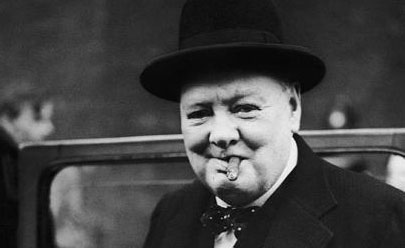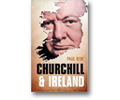
|
Professor Lord Paul Bew — Churchill & Ireland
Winston Churchill spent his early childhood in Ireland, had close Irish relatives, and was himself much involved in Irish political issues for a large part of his career. He took Ireland very seriously—and not only because of its significance in the Anglo-American relationship. Churchill, in fact, probably took Ireland more seriously than Ireland took Churchill. Yet, in the 50 years since Churchill's death, there has not been a single major book on his relationship to Ireland. It is the most neglected part of his legacy on both sides of the Irish Sea.
Distinguished historian of Ireland Paul Bew now at long last puts this omission right. Churchill and Ireland tells the full story of Churchill's lifelong engagement with Ireland and the Irish, from his early years as a child in Dublin, through his central role in the Home Rule crisis of 1912–14 and in the war leading up to the Anglo-Irish Treaty of 1922, to his bitter disappointment at Irish neutrality in World War II and gradual rapprochement with his old enemy Eamon de Valera toward the end of his life.
As this long overdue book reminds us, Churchill learned his earliest rudimentary political lessons in Ireland. It was the first piece in the Churchill jigsaw puzzle and, in some respects, the last.
Paul Bew is Professor of Irish Politics at Queens University Belfast, and a crossbench peer in the House of Lords. He is cochair of the Speaker's Advisory Committee for Parliament's commemoration of the 50th anniversary of Churchill's death. He is also the author of numerous books and articles on Irish political history, including Ireland: The Politics of Enmity, 1789–2006 (2007), published by Oxford University Press.
|

|
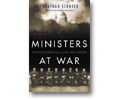
|
Jonathan Schneer, PhD — Ministers at War: Winston Churchill and His War Cabinet
In May 1940, with France on the verge of defeat, Britain alone stood in the path of the Nazi military juggernaut. Survival seemed to hinge on the leadership of Winston Churchill, whom the King reluctantly appointed Prime Minister as Germany invaded France. Churchill's reputation as one of the great 20th-century leaders would be forged during the coming months and years as he worked tirelessly first to rally his country and then to defeat Hitler. But Churchill—regarded as the savior of his nation, and of the entire continent—could not have done it alone.
As prize-winning historian Jonathan Schneer reveals in Ministers at War, Churchill depended on a team of powerful ministers to manage the war effort as he rallied a beleaguered nation. Selecting men from across the political spectrum—from fellow Conservative Anthony Eden to leader of the opposing socialist Labor Party Clement Attlee—Churchill assembled a war cabinet that balanced competing interests and bolstered support for his national coalition government. The group possessed a potent blend of talent, ambition, and egotism. Led and encouraged by Churchill, the ministers largely set aside their differences, at least at first. As the war progressed, discord began to grow. It reached a peak in 1945: with victory seemingly assured, Churchill was forced by his Ministers at War to dissolve the Government and call a general election, which, in a shocking upset, he lost to his rival Attlee.
Authoritatively recasting our understanding of British high politics during World War II, Schneer shows that Churchill managed the war effort by managing his team of supremely able yet contentious cabinet members. The outcome of the war lay not only in Churchill's individual brilliance but also in his skill as an executive, and in the collective ability of men who muted their personal interests to save the world from barbarism.
Jonathan Schneer, PhD, who received his BA from McGill University in 1971 and his PhD from Columbia University in 1978, is the modern British historian at Georgia Tech University in the School of History, Technology, and Society. He is a coeditor of two books and the author of six more, including London 1900: The Imperial Metropolis, The Thames: England's River; and The Balfour Declaration: The Origins of the Arab-Israeli Conflict, which won a 2010 National Jewish Book Award. In 2015 he published Ministers at War: Winston Churchill and His War Cabinet.
|

|
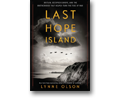
|
Lynne Olson — Last Hope Island
When the Nazi blitzkrieg rolled over continental Europe in the early days of World War II, the city of London became a refuge for the governments and armed forces of six occupied nations who escaped there to continue the fight. So, too, did General Charles de Gaulle, the self-appointed representative of free France.
As the only European democracy still holding out against Hitler, Britain became known to occupied countries as "Last Hope Island." Getting there, one young émigré declared, was "like getting to heaven."
In this epic, character-driven narrative, acclaimed historian Lynne Olson takes us back to those perilous days when the British and their European guests joined forces to combat the mightiest military force in history. Here we meet the courageous King Haakon of Norway, whose distinctive "H7" monogram became a symbol of his country's resistance to Nazi rule, and his fiery Dutch counterpart, Queen Wilhelmina, whose antifascist radio broadcasts rallied the spirits of her defeated people. Here, too, is the Earl of Suffolk, a swashbuckling British aristocrat whose rescue of two nuclear physicists from France helped make the Manhattan Project possible.
Last Hope Island also recounts some of the Europeans' heretofore-unsung exploits that helped tilt the balance against the Axis: the crucial efforts of Polish pilots during the Battle of Britain; the vital role played by French and Polish code breakers in cracking the Germans' reputedly indecipherable Enigma code; and the flood of top-secret intelligence about German operations—gathered by spies throughout occupied Europe—that helped ensure the success of the 1944 Allied invasion.
A fascinating companion to Citizens of London, Olson's best-selling chronicle of the Anglo-American alliance, Last Hope Island recalls with vivid humanity that brief moment in time when the peoples of Europe stood together in their effort to roll back the tide of conquest and restore order to a broken continent.
Lynne Olson is The New York Times best-selling author of Those Angry Days: Roosevelt, Lindbergh, and America's Fight Over World War II, 1939–1941, and Citizens of London: The Americans Who Stood with Britain in Its Darkest, Finest Hour. Among her five other books is Troublesome Young Men: The Rebels Who Brought Churchill to Power and Helped Save England. She lives with her husband in Washington, DC.
|

|
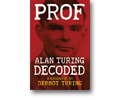
|
Sir John Dermot Turing — Prof: Alan Turing Decoded
Alan Turing was an extraordinary man who crammed into a life of only 42 years the careers of mathematician, code breaker, computer scientist, and biologist. He is widely regarded as a war hero grossly mistreated by his unappreciative country, and it has become hard to disentangle the real man from the story. It is easy to cast him as a misfit, the stereotypical professor. But actually Alan Turing was never a professor, and his nickname "Prof" was given to him by his code-breaking friends at Bletchley Park.
Now, Alan Turing's nephew, Dermot Turing, has taken a fresh look at the influences on Alan Turing's life and creativity, and the later creation of a legend. Dermot's vibrant and entertaining approach to the life and work of a true genius makes this a fascinating read. This unique family perspective features insights from secret documents only recently released to the UK National Archives and other sources not tapped by previous biographers, looks into the truth behind Alan's conviction for gross indecency, and includes previously unpublished photographs from the Turing family album.
Dermot Turing was educated at Sherborne and King's College, Cambridge. After completing his DPhil in Genetics at New College, Oxford, Dermot moved into the legal profession working first for HM Treasury Solicitor's Department and then for Clifford Chance where he has remained (as a partner since 1999). Dermot is currently based in London in Clifford Chance's Financial Services and Markets Group. His professional focus is on regulation, insolvency, and risk management for financial institutions.
Dermot is the nephew of Alan Turing (1912–1954), who is well known to have been one of Bletchley Park's leading cryptanalysts as well as a founder of the science of artificial intelligence. Naturally enough, Dermot has followed closely the gradual revelations of the achievements of the Bletchley code breakers from the first release of materials in 1975 and the reopening of Bletchley Park to the public in the early 1990s.
|

|
